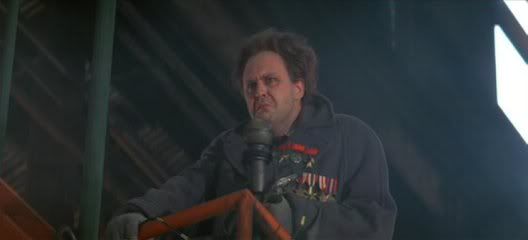
"Cult films don't make money." - BILL LANGE, producer of Massacre at Central High
"Laugh-a while you can, monkey-boy." - DR. EMILIO LIZARDO, eccentric Italian physicist possessed by Lord John Whorphin, an evil Red Lectroid from Planet 10
When I suggested "Cult on Arrival" month I had but one film in mind and that was 1984's The Adventures of Buckaroo Banzai Across the 8th Dimension, a fast-paced, effects-laden science fiction extravaganza that had the potential to kick off a franchise but fizzled at the box office. Made by a first-time producer-director (W.D. Richter, who cut his teeth as a screenwriter on films like Peter Bogdanovich's Nickelodeon, which he co-wrote with the director, and the late-'70s adaptations of Invasion of the Body Snatchers and Dracula) and a relatively unknown screenwriter (Earl Mac Rauch, whose only prior credits were the little-loved urban thriller A Stranger is Watching and Martin Scorsese's sprawling musical New York, New York), Buckaroo Banzai was always going to be a hard sell, but you can tell that they made the film for the love of it, not because they thought they were going to get rich off it. (Of course, if it had been a runaway success, I don't believe they would have turned those riches down.)
The other group of people that Richter and Rauch arguably made the film for were the sci-fi, fantasy and comic book geeks who were in the habit of anointing whatever blockbusters Hollywood threw their way and could presumably be counted to spread the word about their film's idiosyncratic hero, a world-renowned neurosurgeon, rocket scientist and rock star who just so happened to also have his own comic book (at least in the world of the film). And so the studio went directly to the fans, showed them the trailer, handed out Buckaroo Banzai headbands (one of which I was given by a college friend) and did whatever they could to try to drum up interest in the film. These tactics drew the ire of notable crank Harlan Ellison, who used his January 1985 column in The Magazine of Fantasy and Science Fiction to decry the "billion dollars' worth of promotional hype such as Big Brother-style rallies at sf conventions" being used to sell what he called "this village idiot of a movie." Needless to say, he was not impressed with it.
Luckily, I was already an avowed fan of Buckaroo Banzai, having seen it many times on cable, by the time I read Ellison's withering four-paragraph dismissal of it in his 1989 collection Harlan Ellison's Watching, so I've never let it influence my opinion of the film. Then again, within its pages Ellison also derides Star Wars, John Carpenter's The Thing, Gremlins ("it is a corrupt thing, vicious at its core"), The Last Starfighter, Back to the Future, Robocop ("a film that struck me as being made by, and for, savages and ghouls") and Spaceballs -- all of which I have varying degrees of affection for -- so I know to take his criticisms with the proper amount of seasoning. Then again, he also has high praise for an obscure 1973 film called Slither, which just so happened to be Richter's screenwriting debut, calling it "the world's longest, funniest Polack joke." And he champions Big Trouble in Little China, which Richter also had a hand in, so it's clear he doesn't prejudge a film one way or the other based on who made it (although he never does seem to have a kind word for Brian De Palma).

